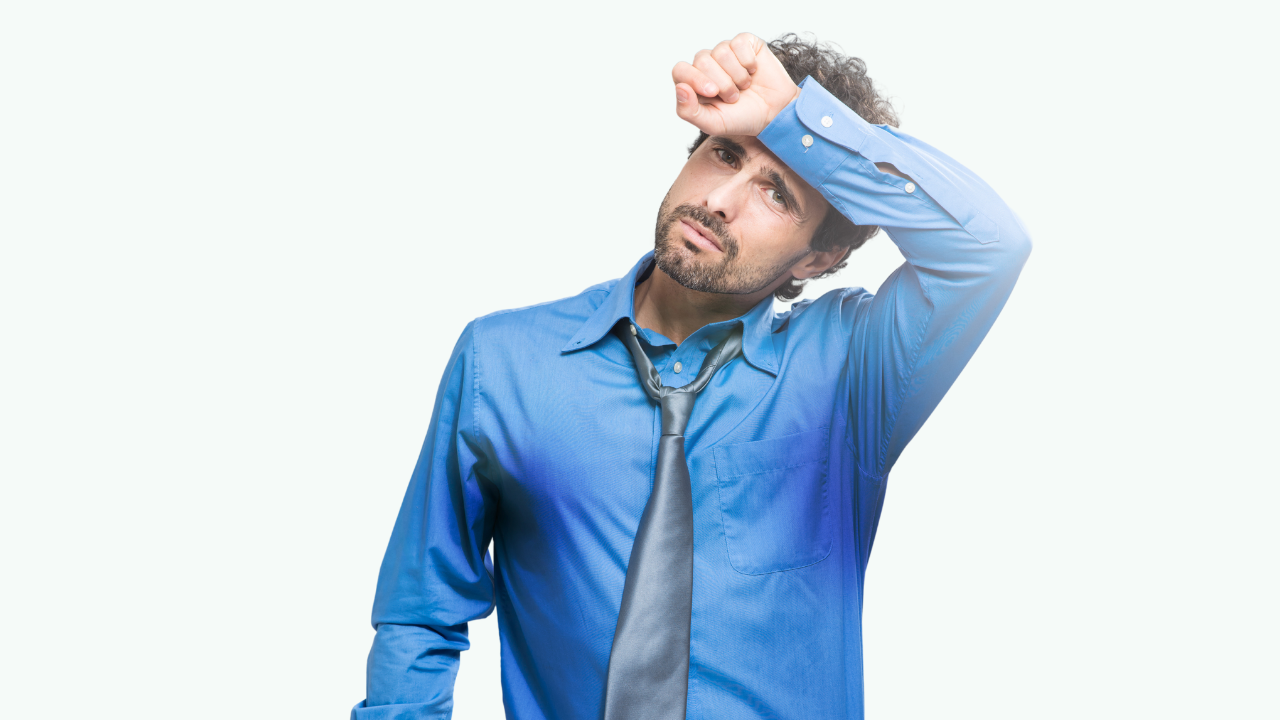

Anxiety-induced sweating is a physiological response to fear and stress that could impact people both physically and emotionally.
People often experience sweating, shallow breathing, and rapid heartbeat as a response to anxiety. It can manifest on various body parts, such as the palms, soles of the feet, face, and armpits.
Thus, understanding the connection between anxiety and sweating is crucial for people experiencing these symptoms.
In this article, I will mention some of the best coping strategies to help you manage the physical and emotional impact of anxiety.
Read more to know the causes, methods of prevention, and the relation between anxiety and sweating.
Anxiety could trigger the activation of the sympathetic nervous system, leading to increased sweating as part of the body’s physiological response to perceived threats.
When faced with a threat, real or imagined, the sympathetic nervous system triggers the fight-flight-freeze reaction.
This response seeks to prepare the body for action by increasing energy expenditure, which might elevate body temperature.
Thus, sweat glands are signaled to produce sweat, helping to cool the body and enabling continued physical work by preventing overheating during this heightened state.
People with conditions like GAD or generalized anxiety disorder may experience persistent and excessive worry about daily situations, including concerns about sweating.
Thus, excessive worry might further worsen anxiety symptoms, creating a cycle where anxiety triggers sweating, and the awareness of sweating intensifies anxiety.

Performing deep breathing exercises could activate the parasympathetic nervous system, facilitating a state of calmness and signaling safety to the body during periods of anxiety.
Deep breathing could send a clear message to the body that the perceived threat has passed, helping to reduce anxiety and stress. It acts as a brake to the body’s stress response, potentially slowing down the physiological processes that accompany feelings of anxiety.
You may calm yourself by focusing on your breath and intentionally slowing down inhalations and exhalations.
Avoiding spicy foods may help reduce sweat production triggered by anxiety. Spicy foods can stimulate the body, increasing perspiration in stressful situations.
Regular physical exercise may promote overall health and work as a stress relief mechanism. It could help regulate the body’s response to anxiety, potentially decreasing excessive sweating episodes.
Maintaining good personal hygiene practices and wearing breathable clothing might contribute to better management of anxiety-induced sweating.
Including relaxation techniques in your routine might help to effectively manage anxiety and reduce symptoms like sweating.
You could break the anxiety-induced sweating cycle and regain control over physical reactions by refocusing your attention.
| Technique | Description | Benefits |
|---|---|---|
| Mindfulness Meditation | Focuses on the present moment, allowing people to observe thoughts and feelings | Promotes relaxation and decreases anxiety levels |
| Physical Exercise | Engaging in physical activity releases endorphins, improving mood and reducing stress | Enhances overall health and provides a healthy outlet for anxious energy |
| Creative Expression | Involves artistic activities like painting, writing, or music to express emotions | Allows for emotional release and distraction from anxious thoughts and physical symptoms |
| Social Support Network | Seeking comfort and guidance from friends or loved ones during times of stress | Provides reassurance, perspective, and a sense of connection with others |
When feeling too hot, you may experience heightened anxiety about sweating, worsening the condition. Thus, executing these strategies to stay cool could mitigate these effects.
Engaging in self-talk may allow you to acknowledge your emotions without judgment, encouraging self-compassion and acceptance of your current state.
It may help normalize your physical reactions to anxiety, such as sweating, by understanding that these responses are a natural part of the body’s stress response.
Encouraging phrases like “I’m strong, and I’ll get through this” may help develop strength against anxiety-induced physical symptoms, empowering you to face your challenges positively.
Trying positive self-talk could assist in regulating emotions during anxiety-provoking situations. It might help you manage your stress levels and potentially reduce the intensity of physical reactions like sweating.
When experiencing anxiety, the autonomic nervous system is activated, triggering the fight-or-flight response and releasing stress hormones like cortisol. This physiological reaction prepares the body for perceived danger, increasing heart rate, blood flow, and body temperature, resulting in sweating.
Anxiety prompts the brain to signal the body for a disaster, culminating in sweating on palms, face, underarms, groin area, or soles of feet. This natural response affects people, causing them to sweat excessively, known as hyperhidrosis.
The human body has millions of sweat glands, with eccrine glands primarily releasing water-based sweat, while apocrine glands are activated during stress.
These apocrine glands, larger in size and located in areas with more hair follicles, such as the armpits, might excrete a thicker sweat containing higher levels of protein and lipids. When combined with the natural bacteria on our skin, this composition of sweat may produce a more noticeable and personal odor.
Treatment options for anxiety-induced sweating include:
If you are feeling excessive episodes of anxiety accompanied by extreme sweating and other symptoms like chest pain, appetite issues, and trouble concentrating. It is the right time to see a doctor for better mental support.
Anxiety could affect your daily lifestyle by hindering your productivity, energy levels, and overall mental health. Seeking a medical expert would allow you to build an effective coping mechanism while helping you deal with your unhealthy patterns that may trigger anxiety.
Experiencing anxiety-induced sweating could lead to emotional distress and physical discomfort. People may avoid social situations or activities that trigger sweating, affecting their daily routines and confidence levels.
You can manage your anxiety efficiently by practicing methods like deep breathing, lifestyle adjustments, and practicing positive self-talk.
Engaging in physical activity may allow you to stay more energetic and motivated all day. Prioritizing a balanced and nutritious diet might help support overall mental health.
You can also consult with a psychologist to learn about the underlying causes triggering your anxiety.
They will help you manage your stress by providing optimal mental health support through their sessions and medications.
Tyler Read earned an undergraduate academic degree from Sonoma State University, California and is a certified personal trainer (CPT) with NASM (National Academy of Sports Medicine). With over 16 years of experience, Tyler has trained clients both online and in-person.
He is passionate about helping others turn their love for fitness into a career. Tyler has worked with many local and commercial gyms before establishing his successful private personal training business, which he continues to operate.
